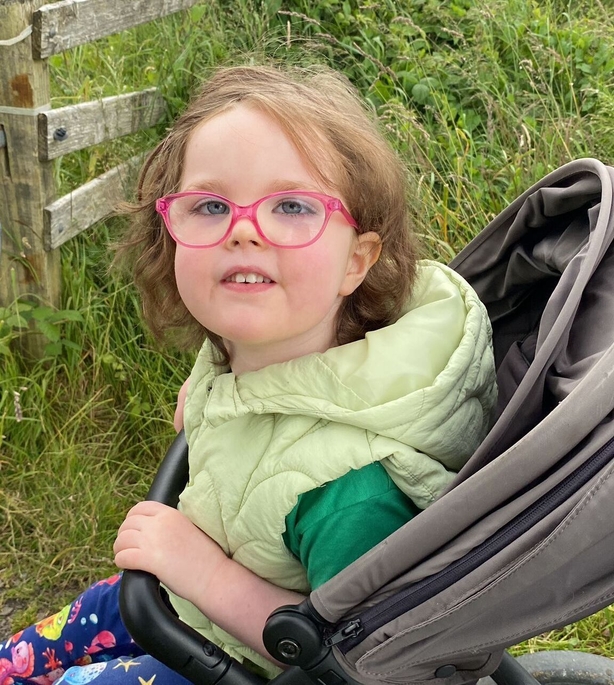The family of a four-year-old girl with epilepsy has appealed for help from the State as they struggle to pay €1,000 per week for the medicine that has stopped her life-threatening seizures.
Clodagh Walsh lives with her parents Sinead and Colin in Dromod, Co Leitrim. The family moved there from Co Westmeath in recent years and have said they are "emotionally and financially" drained as they await news on whether a potentially life-saving drug can be publicly funded.
Speaking on RTÉ's Drivetime, Sinead described her "beautiful, bright and bubbly" daughter as being "feisty and determined" since her diagnosis of Dravet syndrome - a rare form of epilepsy that begins in infancy and caused her frequent seizures and significant developmental delays.
Describing the diagnosis as "daunting" and "hard to take", Sinead explained the seizures have resulted in them having to call "gardaí, paramedics and air support" to their home - with Clodagh airlifted to Children’s Health Ireland at Temple Street in Dublin on three occasions following respiratory arrest, cardiac arrest and seizure.
We need your consent to load this rte-player contentWe use rte-player to manage extra content that can set cookies on your device and collect data about your activity. Please review their details and accept them to load the content.Manage Preferences
After the third incident, the family were told about a drug called fenfluramine.
As clinical trials of the drug were not open to them due to Clodagh’s age, Sinead said they were informed they would have to fund the drug themselves and "through fantastic family and friends" they fundraised enough to start Clodagh on the drug last November.
"Unbelievably" she said, Clodagh has been seizure free in the ten months since then with "improvements in her balance, her mood".
Everything improved, she said, with "no seizures and no hospitalisations. It was just unbelievable".

But ten months on, Sinead said the family was now emotionally and financially drained by "crippling" bills. A bottle of fenfluramine costs around €2,040, which lasts them just over two weeks for Clodagh’s twice-daily dose.
This works out at €980 per week for the family.
With those bills expected to rise as Clodagh’s prescription increases as she grows, the family have had regular contact with the HSE and the Department of Health, appealing for them to cover the cost of fenfluramine.
In July, Minister for Health Stephen Donnelly told the Dáil that he had contacted the National Centre for Pharmacoeconomics (NCPE) on the issue, emphasising the "urgency" of this particular case, that "we have a sick child here".
Mr Donnelly was responding to Fianna Fáil TD Robert Troy, one of a number of Oireachtas members to raise Clodagh’s case, telling him: "We have to let the apparatus of the State engage in commercial discussions."
Mr Troy told Drivetime the process was "too slow" as he called on the drug company, UCB Pharma, to make the treatment available to Clodagh on "compassionate grounds" pending the outcome of negotiations.
Speaking on the same programme, Consultant Paediatric Neurologist at CHI at Temple Street, Professor Bryan Lynch, explained that Dravet syndrome was a rare and severe form of infantile epilepsy that carries an increased risk of mortality.
The evidence is that fenfluramine "reduces that risk" he said, and also "importantly improves quality of life" for children who are having very severe seizures.
As it is already been publicly funded in European countries like France, Italy, Germany Spain and the United Kingdom, Professor Lynch expressed the hope that Ireland would "hopefully" follow suit "shortly".
In a statement to RTÉ’s Drivetime, a spokesperson for the Department of Health said UCB Pharma currently has two pricing and reimbursement applications for two separate indications submitted to the HSE for fenfluramine.
One indication is for Dravet syndrome and the second indication is for the treatment of Lennox-Gastaut syndrome.
The NCPE recommended that fenfluramine be considered for reimbursement if cost effectiveness can be improved relative to existing treatments.
The application remains under consideration with the HSE.
The HSE cannot make any further public comment on possible outcomes from the ongoing process, it said.
Drivetime also sought comment from UCB Pharma.
With the family of Clodagh Walsh hoping she will go to pre-school soon, her mother said that time was of the essence as they have spent over €48,000 so far on fenfluramine and can no longer fund the drug she can not be without now, concluding her emotional appeal by saying "it’s about keeping my daughter alive".







